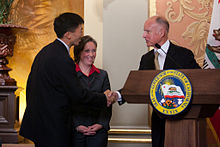Goodwin Liu
Goodwin Hon Liu (Chinese: 劉弘威; pinyin: Liú Hóngwēi; born October 19, 1970)[2] is an American jurist who has served as an associate justice of the Supreme Court of California since 2011.
On February 24, 2010, President Barack Obama nominated Liu to fill a vacancy on the U.S. Court of Appeals for the Ninth Circuit.
[8] On July 26, 2011, Governor Jerry Brown nominated Liu to a seat on the Supreme Court of California, succeeding Associate Justice Carlos R.
[9] Three days later, President Obama formally notified the Senate that he was withdrawing Liu's nomination for the federal Ninth Circuit Court of Appeals.
[12] His parents, Wen-Pen (劉文彬) and Yang-Ching Liu (蔡洋清), were Taiwanese doctors who immigrated to the United States from Taiwan as part of a program that recruited physicians in primary care to practice in rural areas.
[16] After winning a statewide science competition at age 16, California governor George Deukmejian selected Liu to enroll in a special program at Lawrence Berkeley National Laboratory.
[16] He received multiple distinguished awards as an undergraduate,[b] was elected co-president of the student body,[20] and worked as a reporter for The Stanford Daily.
[16] While reporting on hate speech codes for the school newspaper as a freshman, he met Stanford Law professor Gerald Gunther, who invited Liu to his office.
"[16] During his senior year in college, Liu was a student leader at the Haas School of Business working with Stanford president Donald Kennedy.
[16] A year earlier, however, Kennedy personally recommended Liu for a Rhodes Scholarship for overseas study in England at Oxford University.
[16] As a Rhodes Scholar, Liu initially entered Lady Margaret Hall, Oxford,[21] to begin a doctoral program in immunology, but decided against a medical career because "it was too far removed from the things that really moved me.
[24] Liu clerked for Justice Ruth Bader Ginsburg of the U.S. Supreme Court, where among other things, he contributed a draft to her dissent in Bush v.
On February 24, 2010, President Obama nominated Liu to a new judgeship seat on the Ninth Circuit created by the Court Security Improvement Act of 2007; which became effective on January 21, 2009.
[37] Liu's criticism of Chief Justice John Roberts and especially his statement during Samuel Alito's Supreme Court nomination[38] was targeted by Senate Republicans as proof of his lack of judicial temperament and partisanship.
He noted, however, that the problem with the confirmation process is that it has become transformed into requiring 60 votes as opposed to a bare majority, which was not part of the Constitutional design.
[43] In submitting his nomination, Brown said that "[Liu] is a nationally recognized expert on constitutional law and has experience in private practice, [in] government service and in the academic community.
"[26] On August 30, the state bar commission that screens all nominees gave Liu a "unanimously well qualified" rating, describing him as "brilliant, impartial, and with a work ethic second to none ... [h]e has an unwavering commitment to equal access to justice and will treat all litigants fairly, without regard to wealth or position in society.
[47] As of November 11, 2022[update], following the 2022 election, he was retained by California voters to continue to serve as an associate justice with 69.2% of an affirmative vote.
The complaint arose from the Song-Beverly Credit Card Act of 1971, which sought to protect consumer privacy when purchasing products in a store.
[51] He has written in favor of affirmative action, abortion rights, and same-sex marriage and has been critical of Bush-era waterboarding policy and the death penalty.
"[53] Justice Liu has defended the California Supreme Court's practice of drafting its opinions before hearing oral arguments, as a gross mischaracterisation of its process.
[47] Gerald Uelman, a professor and former dean of the University of Santa Clara School of Law, was impressed with Liu's work, saying "He displays a very independent streak.
Bob Egelko, a legal affairs reporter for the San Francisco Chronicle, agreed, saying that "his dissents come within the ideological boundaries of [the California Supreme Court], which is an institution that in general moves incrementally.

